What’s the Difference Between Patents, Copyrights and Trademarks
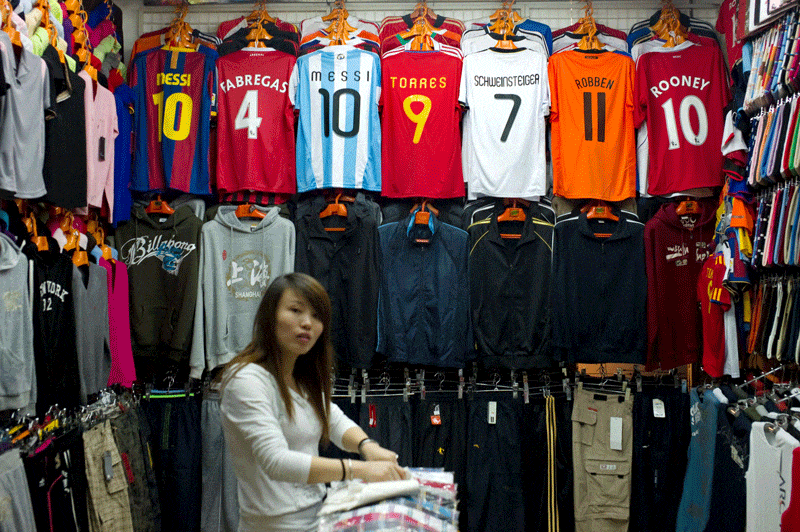
When China joined the World Trade Organization in 2001, there were hopes that its title as the counterfeit capital of the world would be no more. However, if you have ever visited Nanjing Lu in Shanghai and purchased three “Rolex” watches for under $20, you know counterfeit products are still a big problem in China.
In the West, respect for intellectual property like trademarks and patents is well ingrained in our culture. Most of us would never think about taking some blue M&Ms and selling them as Viagra for $20 a bottle. In China, this would be seen as a good business opportunity!
Related Podcast: E174: Avoid Being Scammed When Importing Products from China
Topics Covered
- Trademarks vs Patents (vs Copyright)
- Trademarks When Importing from China
- Trying to Dodge Trademarks
- Patents When Importing from China
- How to Know if a Product is Patented
- The Golden Rush Period Right After a Patent Expires
- What Happens is you Infringe Someone’s IP?
- Selling Copy Cats/Knock-Offs
- Conclusion
Trademarks vs Patents (vs Copyright)
Before we talk about the implications of trademarks and patents when importing from China, it's important to know what a trademark and patent are.
A Trademark is a unique trade name associated with your brand in your industry. Viagra and M&Ms, like mentioned above, are examples of popular trademarks along with the ever-popular counterfeited clothing items like Gucci, Rolex, Calvin Klein, etc. Most of us commonly associate trademarks with the ® and ™ symbols. The ® symbol is reserved for brands that have formally registered their trademarks with government groups such as the USPTO while the ™ is used by those brands that haven't yet registered their brand. Trademarks essentially last forever.
A patent is a piece of intellectual property that grants an inventor exclusive rights to their useful and non-obvious invention, normally for 20 years. The medicinal formula for Viagra was actually patented at one point, so Pfizer held both a trademark for the name Viagra and a patent on the formula. Note, trademarks are often used for patented products but they are more or less unrelated.
Finally, Copyrights are restricted normally for artistic works like poems and songs. They rarely apply to any imported products.
Trademarks When Importing from China
For most of us, trademark law is a lot easier to understand than patent law. We just know that you can't sell any small blender as a “The Magic Bullet”, which is a trademarked. Trademarks are simple to identify by the ® or ™ symbol beside the name/logo, such as below for the “Magic Bullet”.
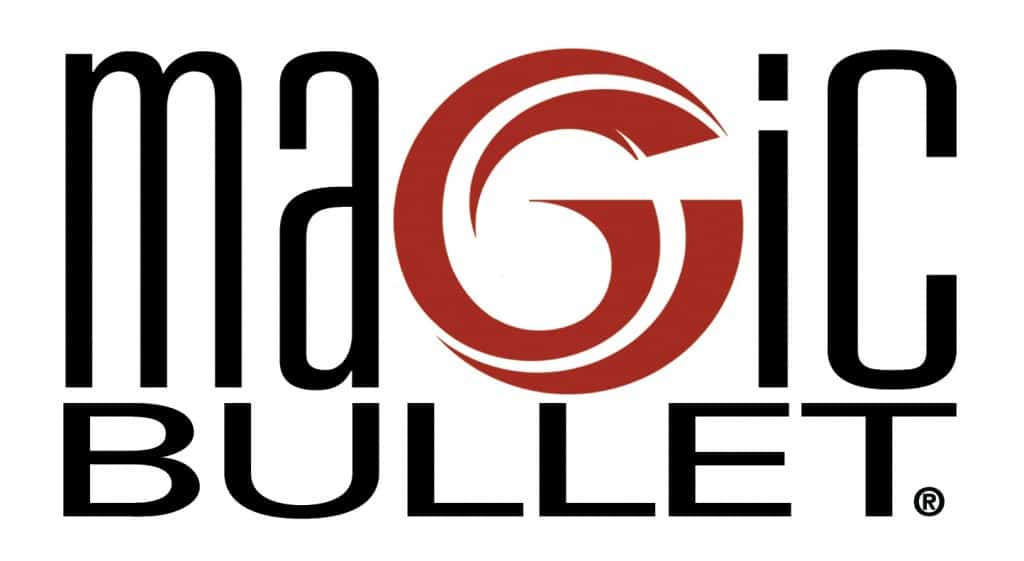
Most Chinese Suppliers understand Trademarks well enough to not advertise their products under a Trademarked name, however, blatant trademark infringement does occur, both by importers and Suppliers. This is mostly done in the case of high fashion items, like Gucci, Calvin Klein, etc. I can't emphasize enough to avoid blatant infringement like this. You might get away with it for a short period of time, but it will eventually catch up to you.
Trying to Dodge Trademarks
Often businesses will try to dodge trademark law by marketing their product with a name similar to a well-known brand, such as MacDonalds or, as shown below, Calvem Klain. Or they'll market it as “Calvin Klein style“. Capitalizing on another company's brand name and/or causing consumer confusion is also a no-no and against the law.
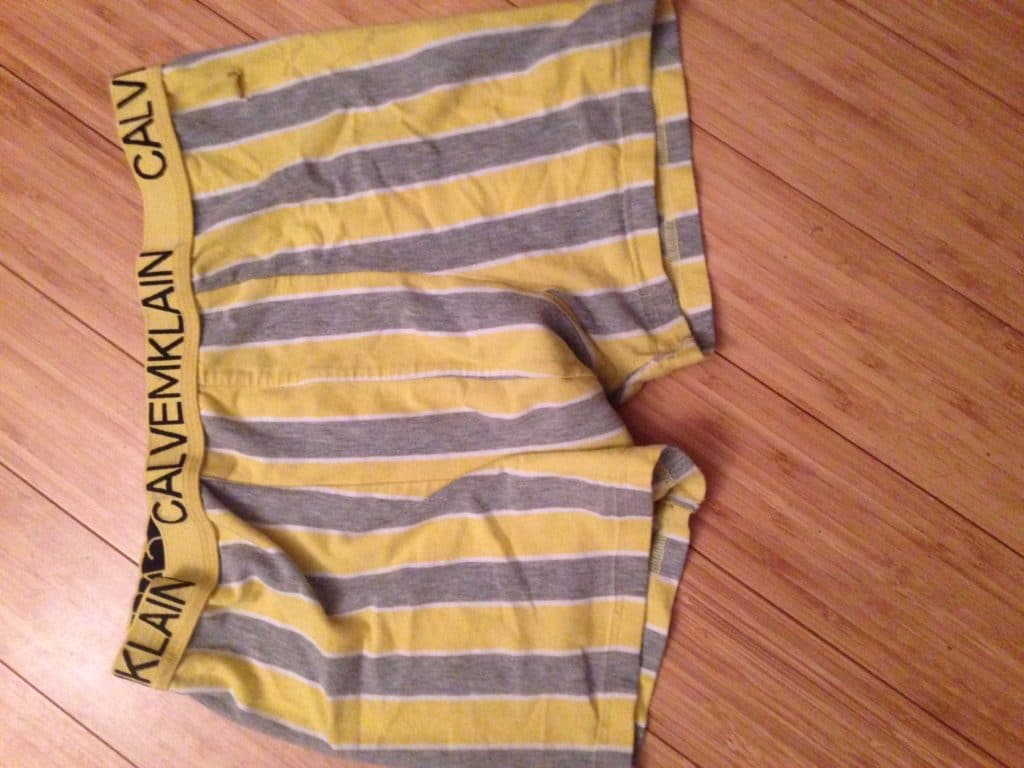
Patents when Importing from China
Patents, rather than trademarks, are the much trickier legality you'll run into when importing products from China.
What makes patents so tricky is that:
- Your Supplier doesn't know whether a product is patented in your country, or doesn't care, and will happily sell it to you.
- What a patent covers is not always cut and dry and it may be ambiguous whether a product is patented.
Plain and simple, if a Supplier thinks that they can sell a product for a profit, even if it is patented, they will produce it and happily sell it to you. It is buyer beware. Your supplier does not view it as their responsibility to warn every potential customer about any potential legal issues surrounding Intellectual Property. Even if they wanted to, patents might exist in Country A but not in Country B. Your Supplier can't be expected to know the patent laws of every single country they sell to.
Compounding the trickiness of the situation, what is and isn't covered by a patent isn't always clear and is often more the responsibility of a patent attorney to determine than anything else. Take for example the case of the Magic Bullet which advertises over 20 patents. For the non-lawyer, we might think that the Magic Bullet has patented any device that cuts food! In reality, many of these patents cover very subtle functions of its blender.
How to Know if a Product is Patented
Most companies will proudly advertise that they are patented products. Take, for example, the Magic Bullet. They have a page on their website displaying all of the patents they hold.
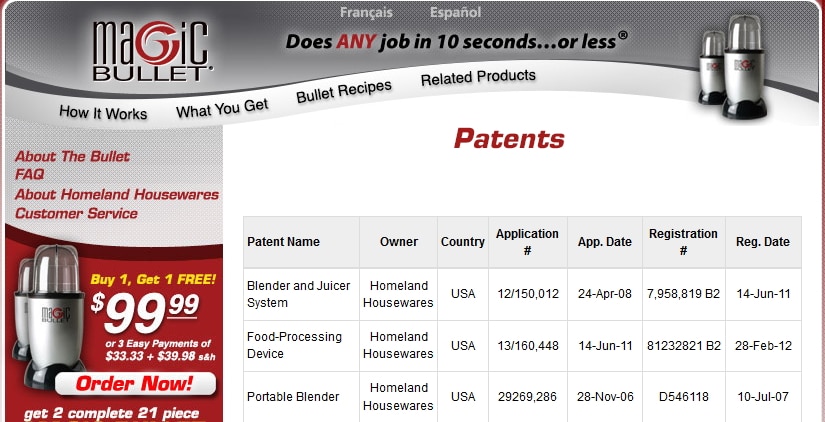
By simply Googling the Registration Number, Google's patent database will bring up a full description of the patent, such as the example here with the Magic Bullet's patent on its blender and juicer system.
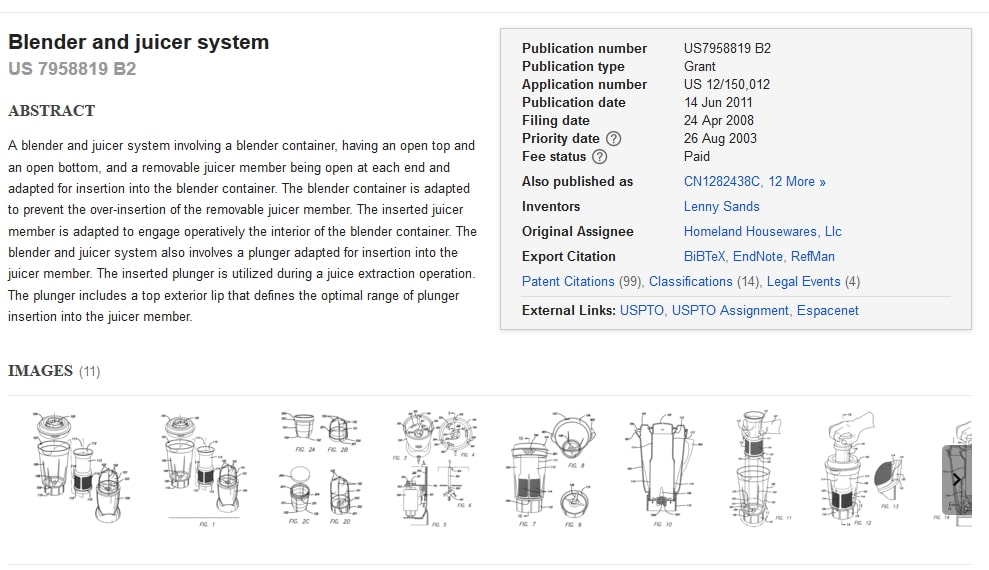
Sometimes finding the actual registration number can be tricky, but often Googling “patent + company + general description”, i.e. “patent Xyz Company ladder” will yield the patent (thank you Google for being so powerful at reading our minds!).
The Golden Rush Period Right After a Patent Expires
A patent normally only lasts for 20 years, which is a relatively short amount of time.
When a product's patent expires, there's often a flood of knockoffs to the market, especially if it's a popular product. (Did you notice a lot more products advertising for umm, “E.D.”, in 2013 when the Viagra patent expired?) For a short amount of time, there will be limited competition which means you can profit very nicely.
Chinese Suppliers unfortunately are more apt to simply copy their Chinese competitors' popular selling products, rather than diligently wait for patents to expire and be first to market with these copies. This means it can take months or years before products with recently expired patents start to show up in traditional marketplaces like Alibaba and Trade Shows. However, if you have an existing relationship with a supplier, they'll often be eager to know about an expired patent and may be willing to manufacture this product at no additional tooling and OEM costs, in the hopes they can sell these products to you and other customers.
What Happens if you Infringe Someone's IP?
One of my suppliers emailed me for help recently regarding one of the products they were selling. The Supplier sold a particular style of ladder to their customer in Italy and a patent holder contacted this company demanding a royalty from them for patent infringement. I knew the product fairly well and I was shocked that it was patented just as much as my Supplier.

We actually determined the alleged patent holder had had their patent expire due to non-payment of their filing dues in Italy, but it didn't stop them from trying to demand a royalty!
Patent and Trademark infringement generally is a civil case, meaning if you accidentally infringe on someone's IP, it'll be dealt with privately and/or through lawyers, not through the police. More often than not, if you're not exceptionally rich, you'll be given a cease and desist or similar warning from the patent/trademark holder. The main consequence is that you may potentially end up with a bunch of unsold inventory. However, if you are exceptionally profitable, the patent/trademark holder may find it worthwhile to sue you for any profits you have made and/or damages.
Selling Copy Cats/Knock-Offs
A product can be trademarked and not patented. In fact, the vast majority of trademarked products are not patented. The brand name M&Ms is patented, but there's nothing to keep you from selling identical chocolate candy and calling it Dave's Delicious Bits. The supermarket is full of such examples, often called generic or private label brands.
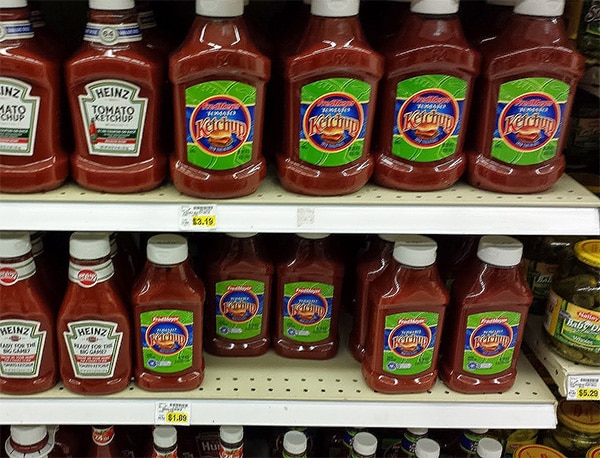
Chinese Suppliers are masters of copying every aspect of a product and manufacturing it cheaper. We might say this lacks creativity or ingenuity, but it is perfectly legal and moral. Every now and then I'll get a customer who comes across one of our products and says with a snide tone “So your product is just a knock off of xyz brand?” to which I often respond “Well xyz brand is just a rip off of abc brand which was a knock off of def brand.”
Conclusion
Legal ramifications aside, respecting others' intellectual property that they have spent vast amounts of time and money into developing is the right thing to do. Many first-time importers will eventually start to develop their own brands and create their own patented products, so it can be a case where Karma can come back to haunt you.
To summarize everything:
- Trademarks last more or less forever and patents last for 20 years
- Never sell your product under a trademarked name
- It can be difficult to tell if a product is patented so look for marketing and packaging that advertises that the product is patented (and Google those patents to see the extent of them)
- Selling copy cat products is fair game




Hi Dave,
Really enjoyed your article, but my question is, if i bought a product from alibaba that is a patented design is it patent infringement for me to resell it? (Even if it is “counterfeit”) I’ve heard whisperings that reselling an item doesn’t infringe on IP, is this true or have I misunderstood something?
Cheers
Yes.
Is it possible to dropship something that has a patent?
Hey Dave,
My name is Andy, a small business owner that mainly focus on selling fashionable jewelry on Shopify and Amazon. We usually import jewelry like Necklace, Rings, Earring, and Bracelet from Alibaba. The question that we are concern with is about patent infringement, first of all we arent sure did the manufacturer company in china copy any designs from USA or other parts of the country that they have patent the jewelry design. If they did, how would I know which jewelry design is illegal to resell? Due to the fact that there are millions of jewelry design each year, its difficult for us to determine which jewelry design is patented or not. Also, we have noticed that other website (third party) has been selling the same jewelry design that was seen on Alibaba. In our case its like a needle in the haystack, there are too many similar jewelry design out in the market and we arent sure which jewelry design did the manufacturer company in china took the design from, and if they did; did they took it from a company that has patented the design or not? What should I do to protect our self from potently being sue in the future?
Thank You
Hi Andy – Patents are always a needle in the haystack and often you don’t find out about someone having a patent until you get the cease and desist :-( I’m not sure of any great ways to know if your product potentially infringes on someone else’s patent except for extensive market research to see if there’s a similar product on the market or paying a patent attorney a very exorbitant fee.
Short answer is, if it doesn’t have a valid patent in the country you’re importing into, yes you can. Most products don’t have patents (and even less with valid patents in Canada). Normally the patent will be advertised on the product if it is patented though.
The product I am planning on private labeling contains 3 components and one of them is patented (but only in China and Korea – slightly different variant). Can I still source this product from China and sell it on Amazon USA? Does the Chinese patent holder have the right the serve me with a cease and desist notice if he/ she discovers that my product is sold on Amazon? Do they have the right to inquire about where and who my suppliers are?
Anyone can send you a cease and desist. There’s no legal requirement. Now whether it can be enforced is a question to complex for this blog.
Thanks. Great read.
If it’s got a patent on it done sell a Chinese copy. Simple. Even if 20 other Amazon sellers do.
Cheers
Not sure what the comment is here but a Chinese copy identical to the patented product would still violate the patent (but many sellers ignore this anyways)
HI David
Let’s say I make a product that is not out there and not patented,,I have searched uspto and Internet, ,
Can I sell an unpatented product that I make? But have it manufactured in china?
Must I patent first? Is this requirement? What are pros and cons of selling unpatented product?
Yes, of course you can sell an unpatented product. The VAST majority of products are not patented. Unless you are basically creating a new innovation you cannot patent a product. The chances are good that if you’re not sure if you’re product can be patented or not, it probably can’t be. There’s no real cons to being patented except the $$$.
Great article. I still have have confusions. Suppose, I am planing to launch a product sold by only 2 sellers on Amazon. I checked on and couldn’t find any related patent registration. But let’s say it is patented, and what if I made color, size and slight design changes and sell the product? Is this could be a fine line? And since the number of sellers who sell identical product are two, we could conclude the product is not patented. right?
Color/Size variations don’t matter – it’s the utility of the product that matters. Making viagra in a yellow pill instead of blue doesn’t get around its patent. And no, multiple sellers do not mean a product isn’t patented. Tons of sellers ignore patents (possibly to their peril).
I am looking at a product to import (for my own business primarily, not to resell, except perhaps to other businesses) that has artwork on it of a well known Japanese video game character. I am assuming that they don’t actually have a licence to use this artwork, so I guess my options are to get the supplier to change the artwork to something generic or to attempt to get a licence for its use.
Have you any experience with licensing products from other trademark holders? Is it realistic to be able to do as a relatively small player? (Another application of this would be products with logos from local sporting teams etc.)
Licensing is basically free money for the trademark holders so it’s in their interest to not be too picky with who they license to, but they also need to be sure the licensee isn’t going to cheapen/damage their brand at the same time. Keep in mind, licensing fees are almost always mid-5 figures and above. I would simply drop them a line – often they’re pretty responsive to inquiries.
Hi, great information really helpful.
If a company in Germany imports a product from china and trademarks this product in Europe. This product is distributed ( wholesaled for retail)throughout Europe including the UK. Can a distributor in the U.K. Import this product direct from the factory in china? I understand the trademark restrictions but I’m unclear as to the packaging rules having brand names on or not. The product has been offered either way. Please can you advise on the correct procedure.
If this one German company is the only one selling/reselling the product, it makes me nervous as there may be patents you’re not aware of. But assuming there’s no patents on the product, there’s nothing wrong with importing an identical product as long as you don’t infringe on their trademark and/or copyright designs (specifically on the packaging). Think about how many different kinds of ketchup the supermarket sells – they’re all the same product just different packaging :)
Great post! When venturing into the private label world, as in your ketchup example-if you can not find a patent on a design yet there is only one company selling them so far is it acceptable to import the ketchup and brand it with your company? It seems like a fine line, finding something generic that is profitable and not imposing on another companies property.
It’s not a fine line – it’s a huge black line with landing lights. If the product has a patent it can’t be private labeled, if it doesn’t it’s all fair game.
Excellent write-up David.
What about copy cats of trademarked characters?
For example, toys of Pokemon, Disney or Marvel characters?
Are they still fair game if the original name (ex. “Superman”) isn’t used?
Thanks!
That’s a fine line – I suspect the appearance of all of those characters is copyrighted. I’m not a copyright expert, but I’d avoid it.
I manufacture in China branded POS merchandise for a brewery in Mozambique ( I am in South Africa). I have a letter from the brewery giving permission for my company to Import from certain companies in China. This does not seem to be enough. My shipper refer to an export licence that need to be bough ( in the absence of a “red Seal”) Manufacturers is reluctant as then the cant claim VAT. To complicate things not all port’s customs accept this. Can you perhaps explain to me what is the correct way to do this type of imports?
Hi Juanita,
This is quite a complicated question and needs a bit more clarificaiton! Your shipping says the factory in China needs an export license? The factory is reluctant as they can’t claim VAT then?
Hello David,
I’m going to sell a product on Amazon with my own brand. I found this product on Alibaba, so I didn’t invent or manufacture it. But if it is not yet sold in my country, can I file a patent ?
Hi,
Probably not :)
David thanks for providing great information,
I found products I’d like to sell on alibaba. The same products are on sold on Amazon under a brand name from a US wholesaler. Amazon doesn’t show any of the same items from different sellers. I checked with USPTO and the items are not under patent. So my question is how can I sell the item under a different asin if it’s sold under a brand name .
Hi Andrew,
If a product is trademarked (and it doesn’t need to be officially registered with USPTO to be trademarked- ‘first use’ is often enough if it’s not a generic term) you won’t be able to sell it under that name. There’s nothing to prevent you from selling the product under a different brand name though assuming the product isn’t patented.
In your summary you mentioned selling copy cat products is fair game but ill get back to this.
Lets say I have an online business importing a hair brush organizer and there is a company in the US that has the same organizer and she secretly imports from the same manufacturer I am going to import from. Can she patent a product that she did not invent/manufacter or lets say she did in fact invent it and they did manufacter it in China can she still patent this product? And lets say it can be patented, if I purchase a bulk of this same hair brush organizer and I put my trademark on it can I still be sued? This goes back to my question, regarding copy cat products being fair game. Is this an example of that? If it is not I guess my main question is can a company patent something that a manufacturer in China made?
To answer your questions: 1) Yes, the patent applies to where the product is sold not made. A U.S. patent means only the patent holder can sell that product in the U.S.. They can make it on the moon and still have the patent valid. 2) If it’s patented, you can’t sell it, even if you buy it from China.
I sure hope you get this message being that your reply above was a year and a half ago! Your comment: “If it’s patented, you can’t see it, even if you buy it from China” makes me ask this next question… I am looking at a product to sell but found a patent application on file. However, the same product is all over Amazon and even Walmart is selling them. How can they do it and why are they not getting in trouble being the biggest resellers on the planet?
Hard to say – probably either someone is infringing their patent or their patent is pretty narrow and the other products have built a similar product that doesn’t infringe their patent.
Great post, glad I found it. I have a specific question… another company imports a specific item from China and has tried to trademark the actual design of the product (in addition to their brand name for it). I understand trademarking the brand name itself, but how can they trademark the design of the product itself when it’s not something they designed and have simply imported it?
As a competitor of this company, I have imported the exact same product, and have begun to sell it under a different name (a generic title, not a specific brand name) and the other company has requested that I cease because they have it trademarked.
So their trademark can limit any other US companies from importing and reselling that same product (assuming they don’t use their trademarked name)?
On a side note, I looked up their trademark, and it was originally declined (for the product design) and is now in the opposition period. Wondering if I could oppose…
Any info on this type of situation?
Thanks!
Hi Danielle,
Just to be clear, a trademark and a patent are two very different things. You can’t trademark a design but you can patent it. You can’t patent a brand name but you can trademark it.
Are you 100% sure it’s not something they designed and had made in China? There could be other factories selling their design illegally.
Hi, David..
I didn’t understand your comment that “Knock offs” are completely legal. I thought that’s what Amazon has been cracking down on. I’m just kind of starting out with private labeling, but I’ve been concerned myself about infringing on someones patent etc.. It seems that a lot of products have some kind of patent on them when searching through Amazon. I’m now considering just being a re-seller even though it’s not as profitable.
Any helpful advice would be appreciated.
Thanks
I mean the knockoffs that don’t infringe on any IP (i.e. for products with recently expired patents, products with strong brands but no patents, products with only trademarks but selling an identical product without the trademark).
Good evening David.
I just read the book IMPORTING FROM CHINA IS EASY. It is really look not so difficult. Only what I am concern about is how to pick the right product. How to find out the product is not patented. In my opinion almost every product has some design patent etc. Not every seller shows patent number on the box. I also tried to check IPO to find patented design and it look like everybody are braking law copping patented design. Can you help with this?
Regards
Peter
Hi Peter,
The VAST majority of products aren’t patented.
How are you brainstorming and looking for products? If you’re looking for extremely popular products that have almost no competition, then yes, they’re probably patented (other wise there would be a lot of competition!). The boring products like shoe laces and fishing rods don’t typically have patents, but the competition is thicker.
What do I do if I have started an order with a China supplier and they informed me a piece on said product is patent and I tell them I no longer want that product because they are replacing the piece with another that doesn’t even perform the intended use for that piece and they tell me they will send the patent piece anyway and will not refund me